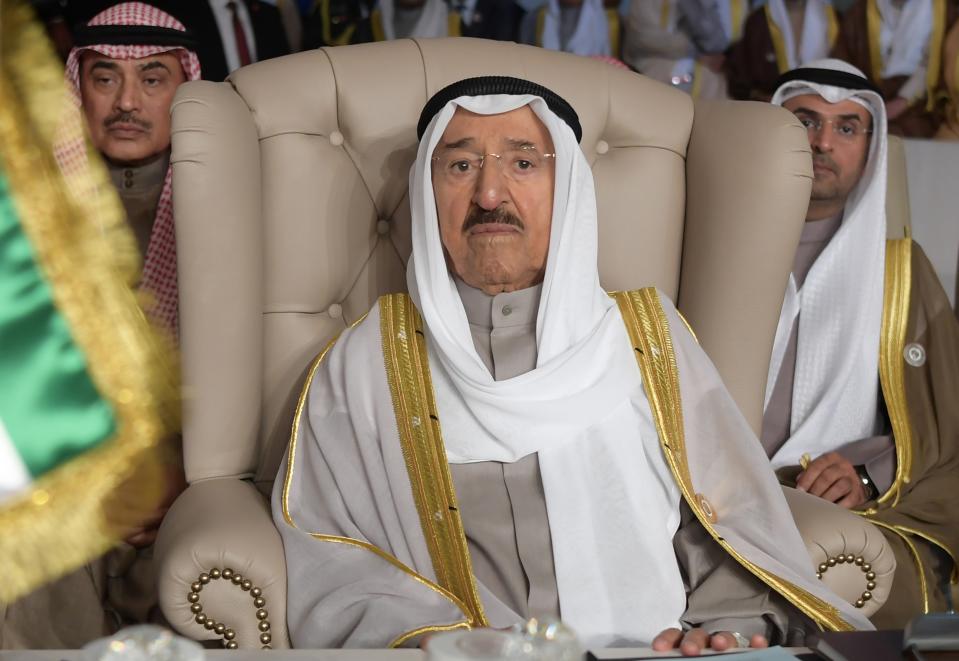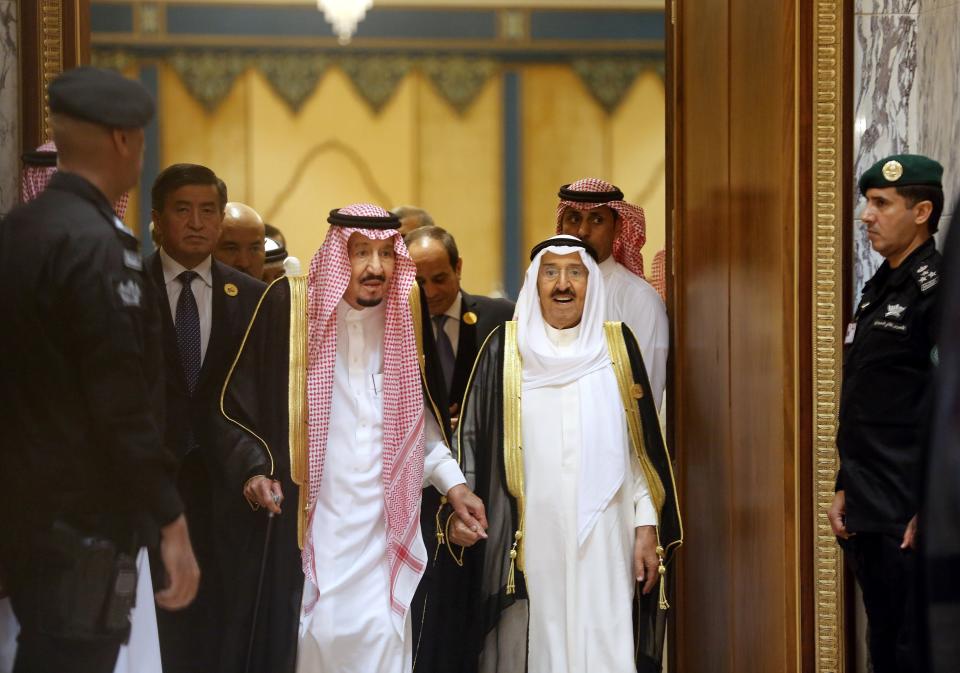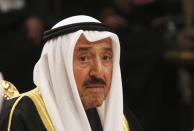Death of Kuwait ruler Sheikh Sabah draws outpouring of grief
DUBAI, United Arab Emirates (AP) — The death of Sheikh Sabah Al Ahmad Al Sabah, the leader of Kuwait who earned a reputation as a seasoned diplomat and a rare ruler who could cross the region’s political and sectarian divides, touched off an outpouring of grief from the Arab world Tuesday.
As news of his death broke, condolence messages streamed in from across the region and from Western countries with longstanding ties to Kuwait, including the U.S. and Britain. Several Arab governments declared days of mourning and lowered their flags to half-staff in his honor.
As a member of the Gulf Cooperation Council, a regional body of Arab Gulf states, Kuwait has often charted its own course, pushing for diplomacy to resolve a bitter dispute between Qatar and other Arab states that continues to this day. Diplomats around the world eulogized Sheikh Sabah as an expert statesman who navigated regional feuds and provided humanitarian aid in times of crisis.
Sheikh Sabah “was an extraordinary symbol of wisdom and generosity, a messenger of peace, a bridge-builder,” said U.N. Secretary-General Antonio Guterres.
From the United Arab Emirates, Abu Dhabi Crown Prince Sheikh Mohammed bin Zayed Al Nahyan offered an admiring tribute, describing the late emir as “a great pioneer in Gulf cooperation.”
In Saudi Arabia, one of Kuwait’s closest allies, Foreign Minister Prince Faisal bin Farhan said Sheikh Sabah “devoted his life to the service of his country and to Arab and Islamic nations,” a sentiment echoed by Bahrain, another close regional partner.
Such was Sheikh Sabah's status that condolences poured in from Qatar and Iran, locked in long-running rivalries with Kuwait's key Gulf allies, as well as from Israel, underscoring his reputation as a source of stability in a turbulent region.
The emir of Qatar, Sheikh Tamim bin Hamad Al Thani, referred to Sheikh Sabah as the “father of all."
“With his departure, the world has lost a beacon and symbol of humanity,” he wrote.
Foreign Minister Mohammad Javad Zarif of Iran wrote on Twitter that he was "pained" by the loss of Sheikh Sabah, who “painted an image of moderation and balance, for Kuwait and for the region."
The Israeli Foreign Ministry lauded Sheikh Sabah for steering Kuwait “to modernity and stability.”
Yemen’s Shiite Houthi rebels, who are battling a Saudi-led military coalition for control of the country, said they appreciated the late emir's support of peace-making efforts.
U.S. Secretary of State Mike Pompeo called Sheikh Sabah “central to building peace and prosperity in the Gulf region," noting that his “humanitarianism and global leadership shaped Kuwait into a prosperous modern state.” From Britain, Prime Minister Boris Johnson said Sheikh Sabah “made a personal contribution to regional stability and humanitarian assistance which will long be remembered.”
“I sincerely hope the long and deep ties that unite our countries will continue,” he added.
In Lebanon, where the late Kuwaiti leader played a key role in trying to end the country’s ruinous 1975-90 civil war and later helped with its reconstruction, President Michel Aoun said his country had “lost a great brother who stood by the Lebanese during the difficult circumstances over the past years.”
Egyptian President Abdel Fattah el-Sissi praised the late emir's long-standing “fraternal stance” toward Egypt, while Jordan's royal court announced a 40-day mourning period nationwide.
In Iraq, Kuwait's northern neighbor, Prime Minister Mustafa al-Kadhimi recalled Sheikh Sabah as one of the first leaders to support Iraqi state-building efforts after the 2003 U.S.-led invasion that toppled the regime of Saddam Hussein, and later in fighting the Islamic State group.
Veteran U.N. diplomat Lakhdar Brahimi cited the friendly present-day relations between Kuwait and Iraq as proof of the late emir's “wisdom and farsightedness” three decades after the Gulf War.
As Kuwait's Cabinet announced that Crown Prince Sheikh Nawaf Al Ahmad Al Sabah would take the reins of power, many expressed hope that the tiny oil-rich country would follow the peacemaking path set by Sheikh Sabah.
“The role that Kuwait traditionally plays in the Middle East as a bridge-builder is needed today more than ever,” said Ban Ki-moon, former U.N. secretary-general and deputy chair of The Elders, a group of world leaders.
___
Associated Press reporters around the world contributed to this report.










